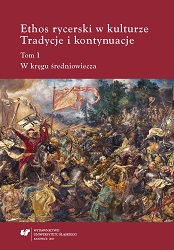Etyka samuraja według japońskich opowieści wojennych
The Samurai Ethic according to Japanese War Stories
Author(s): Joanna Puchalska-Nadolska
Subject(s): History, Language and Literature Studies, Literary Texts, Studies of Literature, Philology
Published by: Wydawnictwo Uniwersytetu Śląskiego
Keywords: samurai; bushido; gunki monogatari; war story
Summary/Abstract: Japanese warriors, known as samurais, have a worldwide recognition. They are associated with a specific honorary code of conduct – bushidō. Its name did not come into common usage until the 20th century, and it was never written down in one canonical form. Bushidō was developing over a few centuries of the supremacy of warriors on the Japanese political stage – from the takover of power by the Minamoto family at the end of the 12th century to the fall of the Tokugawa shogunate in the 19th century. In the early period of samurai rule, bushidō was under a strong influence of Japanese war stories called gunki monogatari. The protagonists of theses stories are samurais, yet, they intersperse actual characters and historic events with literary fiction, elevating some warriors to nearly superhuman heroes. Gunki monogatari depict samurais’ habits such as showing off their mastery of shooting and horse riding, challenging an equal opponent, committing suicide in the face of a hopless situation, and killing all in the family of an enemy. We can also find the praise of qualities like courage, loyalty, prudence, using a stratagem by commanders, and the bunbu ryōdō ideal, that is the ability of one person to master the knowledge of literature and military skills.
Book: Ethos rycerski w kulturze. Tradycje i kontynuacje. T. I: W kręgu średniowiecza
- Page Range: 268-301
- Page Count: 34
- Publication Year: 2017
- Language: Polish
- Content File-PDF

